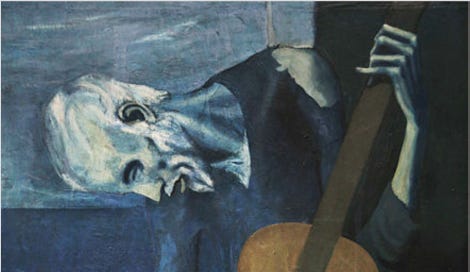Listening to Clear Channel, a Monk from Shu, Play the Strings Li Bai The Shu monk descended Mt Emei By the west slope; he carried Xiangru strings. His hands stroked a melody for me Like pine trees in every mountain glen, And cool water flowed into my soul. The notes lingered; temple frost-bells rang As clouds darkened in the autumn skies. The night fell before I realised. 李白 听蜀僧浚弹琴 蜀僧抱绿绮,西下峨眉峰。 为我一挥手,如听万壑松。 客心洗流水,馀响入霜钟。 不觉碧山暮,秋云暗几重。
The date of this poem is uncertain, but one estimate puts it in 753, during Li Bai’s wilderness years. He had experienced great success and lost it; now he was unable to settle down, and wandering from place to place in search of something. This poem takes place in his home state of Shu, modern Sichuan.
It’s a striking poem because it contains neither his beautiful irony, nor the crazed excesses of his drinking poems. What it has is purity, simplicity, and a wonderful irregular construction within a perfectly regular form. It makes this perfect construction seem artless. Usually, in a poem of this form, each line is an independent sentence, and each couplet forms a meaning unit. (In this poem, a line is five characters; a couplet is ten characters. Confusingly, we usually print a couplet on a single line, so every line on the page contains two lines of poetry.) In this poem, the first couplet gives us the background to the events, as usual (monk arrives with his qin strings). But then the next three lines describe the effect of the playing, covering the next couplet and a half; and the last three lines (couplet-and-a-half) describe how Li Bai didn’t notice the time passing as the playing went on. There’s an unusual break in the middle of the third couplet, and it shakes the poem out of staid symmetry, giving the reader just a taste of the weirdness of this musical experience.
The sincerity of Li’s writing is backed up by the rather pious reference that he chooses. The story of Boya and Ziqi is a paradigm of virtue and friendship. Boya was a great musician, able to represent anything in nature musically. Ziqi was his friend and a man of deep understanding. So when Boya played the sound of the wind in the leaves, Ziqi immediately understood. When Boya played the flowing water, Ziqi knew exactly what he meant.
This is the kind of Sunday school story that Li Bai might have mocked or subverted in another mood. But in this poem he plays it absolutely straight: the monk is simply a great musician, and is able to pour cool water into Li’s heart. The story is not referenced directly, but when a Tang listener heard that there was music playing, and then flowing water, it would have instantly made the connection for them.
The poem maintains strict form, with a tolling -ong rhyme to echo the ringing of temple bells. I didn’t like rhyme for the English, but I tried to represent that bell ringing with the trochee (two stressed beats together) at the start of each line.
Notes
Clear Channel: Buddhist monks take a new name when they enter monastic life. This name (Jun) is the term for dredging the bottom of a canal. Li Bai was a Daoist adept, but this did not stop him from appreciating the wisdom of Buddhist clergy, apparently.
Mt Emei: The highest mountain in Shu (Sichuan). Home to many monasteries.
Xiangru strings: This is actually just a guqin. The poet Sima Xiangru (a particular hero of Li Bai) had a guqin that was apparently painted with a lacquer so black that it had a greenish tint; it was called the “green elegance”. It sounded wonderful, and was played by a master. Calling a guqin a “green elegance” was a bit like calling a violin a Stradivarius.
Frost-bells: These are just the temple bells. They are called frost-bells because of a story of a set of bells that were so resonant, they hummed when the frost of winter hit.
Here’s a Cinix recording of the reconstructed Tang pronunciation.



